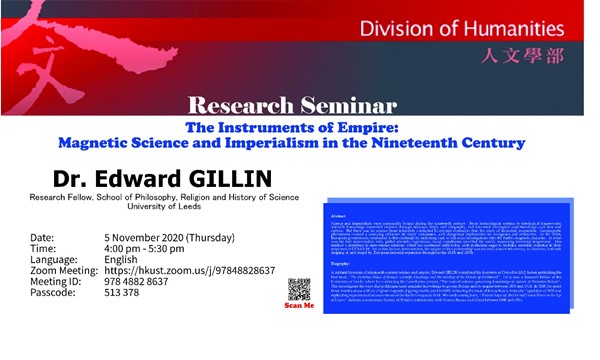Abstract:
Science and imperialism were inseparably bound during the nineteenth century. From technological systems to ideological frameworks, scientific knowledge connected empires through railways, ships, and telegraphy, and informed ideological understandings over race and culture. But there was no science more intimately connected to colonial expansion than the study of terrestrial magnetism. Geomagnetic phenomena exerted a worrying influence on ships’ compasses, with dangerous implications for navigation and commerce. In the 1830s, European governments responded to this challenge by launching vast, world-wide investigations into the Earth’s magnetic character. In what was the first state-funded, truly global scientific experiment, naval expeditions travelled the world,measuring terrestrial magnetism. This marked a departure in state-science relations which has continued until today, with politicians eager to mobilise scientific expertise in their responses to COVID-19. Yet as this lecture demonstrates, the origins of this partenership was not only nineteenth century in character, but both shaping of, and shaped by, European imperial expansion throughout the 1840s and 1850s.
Biography:
A cultural historian of nineteenth-century science and empire, Edward GILLIN completed his doctorate at Oxford in 2015, before publishing his first book, “The Victorian Palace of Science: scientific knowledge and the building of the Houses of Parliament”. He is now a Research Fellow at the University of Leeds, where he is directing the Leverhulme project, “The state of science: governing knowledge of nature in Victorian Britain”. This investigates the ways that politicians used specialist knowledge to govern Britain and its empire between 1850 and 1914. In 2020, he spent three months at sea with an original magnetic dipping needle, built in 1842, following the route of James Ross’s Antarctic Expedition of 1839 and replicating experimental measurements of the Earth’s magnetic field. His forthcoming book, “Entente Imperial: British and French Power in the Age of Empire” delivers a revisionary history of Britain’s relationship with France, Russia, and China between 1848 and 1914.
https://engage.ust.hk/event/6572340
huma@ust.hk
